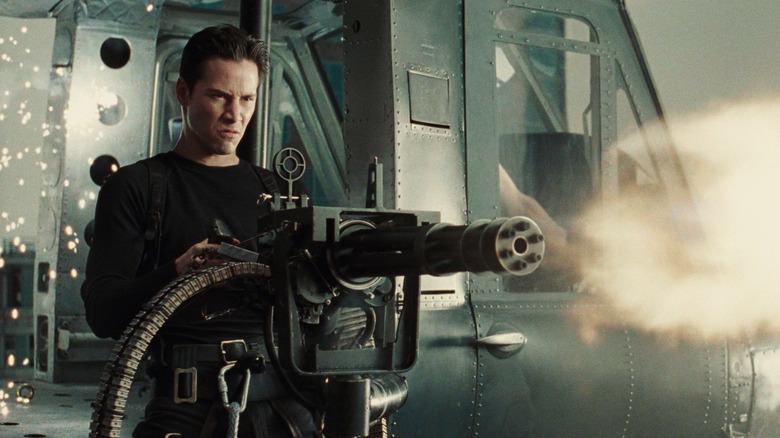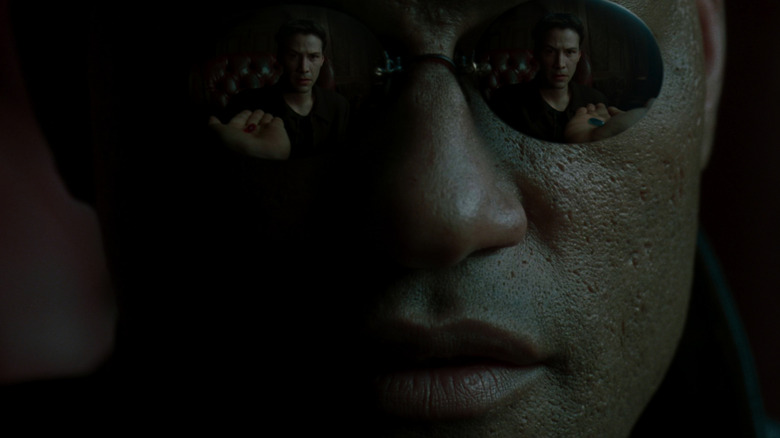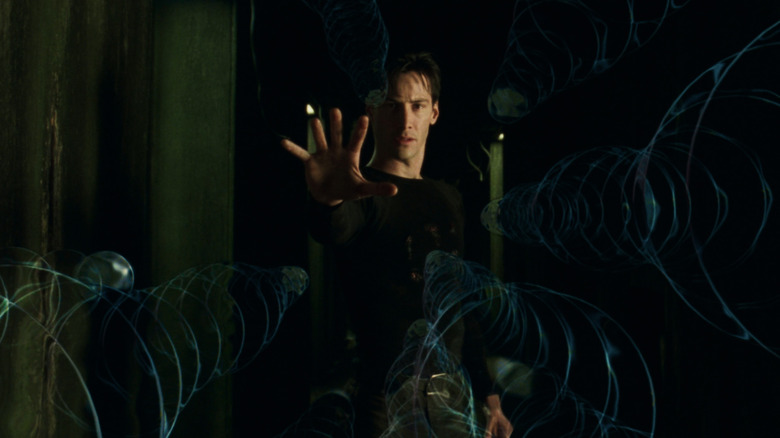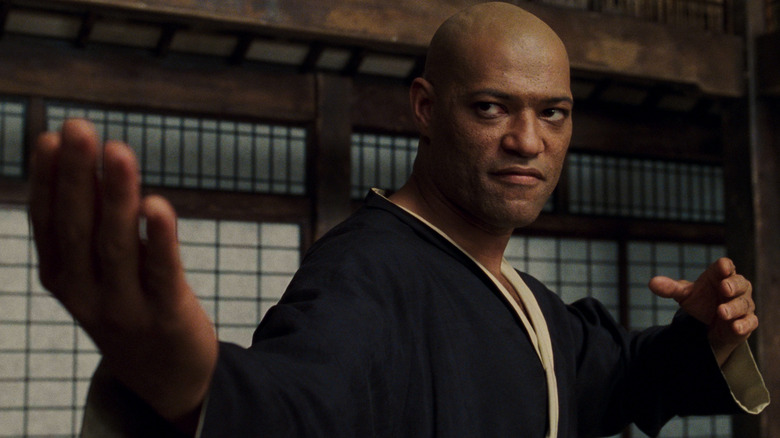The Wachowskis' Pitch For The Matrix Was Like Nothing The Producers Had Seen Before
In 2022, the idea of minds linking with machines isn't all that radical of a notion. Today, any Walmart or Best Buy offers special headsets that foster the ability to enter virtual worlds, but, back in the '90s, the very concept was a tough one to grasp.
In the late '90s, we were stuck with dial-up internet, and criminally slow download speeds, and our idea of virtual communication was asking someone their ASL on AIM. The World Wide Web was in its infancy, and everyone knew it would eventually change the world, but no one knew exactly what that world might look like once it fully matured. In 1999, Lilly and Lana Wachowski offered one terrifying possibility and changed our perception of reality forever.
In his book, Best. Movie. Year. Ever: How 1999 Blew Up the Big Screen (via Wired) Brian Raftery reveals "The Matrix" was a script no one understood, and a film Warner Brothers was reluctant to make before it became a cultural phenomenon.
The Wachowskis
According to Raftery, Lilly and Lana Wachowski were raised in Chicago by a nurse mother and a businessman father, who encouraged their kids to explore art. As children, the Wachowskis devoured the films of Alfred Hitchcock and Francis Ford Coppola, which soaked their young minds with the endless possibilities of cinema. When "Bladerunner" dropped in 1982, the siblings watched it repeatedly, finding inspiration for their own writing in its dystopian tale.
In their youth, the Wachowskis wrote comics, screenplays, and role-playing games, perfecting collaboration methods that would pay off years later. In 1992, the siblings wrote "Carnivore," a script about a soup kitchen that feeds the rich to the poor, and sent it to Lawrence Mattis, an agent in New York. The agent knew the film was much too risque to ever get made, but he was so impressed by the script that he signed the siblings anyway.
The Wachowskis' next script, "Assassins," sold for a million dollars, but was totally rewritten before being shown on the big screen. Lana called the finished product, "our abortion," so it's safe to say the siblings weren't fans of the rewrite. While working on their directorial debut film, "Bound," studio execs were struggling to understand The Wachowskis' third script, "The Matrix."
'Nobody understood it'
Lorenzo di Bonaventura, a top development executive at Warner Brothers in the '90s, had already purchased the script from the siblings, and supported its production, but struggled to get other execs to buy in. He recalls the incredulous reactions he would get when his co-workers read the script:
"Nobody understood it. They would go, 'How does this work? I'm sitting in a room, but I'm actually living in a machine? What the f*** are we doing?'"
The Wachowskis' directorial debut film was successful, but the studio remained reluctant to make a film about sentient machines that harvest oblivious humans. The writers had spent years developing the story, combining their interests in physics, Buddhism, and mythology into one story, and they were determined to see their passion project become a reality. They hired comics artist Geof Darrow to design the futuristic technology that ran "The Matrix," and artist Steve Skroce to create storyboards, which the creators used to explain their idea.
As di Bonaventura remembers the pitch session:
"It was an unusual show. One of the Wachowskis was explaining the story, and the other was making sound effect noises."
After the odd pitch, the execs seemed a little less hesitant about the script, and began discussing money. I like to think they were wowed by The Wachowskis sound effects.
By the late '90s, Warner Brothers was open to taking risks with new ideas, but they weren't willing to lose money. The studio agreed to give the film a $60 million budget, but it had to be filmed in Australia, where production was cheaper.
A strong poker hand
The almost four-month-long shoot had its fair share of problems. Hugo Weaver (Agent Smith) and Carrie-Anne Moss (Trinity) both sustained injuries attempting stunts, and the film's costs were increasing by the day. Throughout filming, edited portions of the film were sent back to Warner Brothers, and what they saw excited them. This gave The Wachowskis enough leverage to call the studios' bluff when they threatened to cut several key scenes from the shooting schedule.
The studio sent editor Zach Staenberg to deliver this threat to the creators:
"They had a way of talking that was very much like twin speak. And they said, in their almost offhanded way, 'If we don't have those scenes, we don't have the movie—and they can get someone else to finish it.' ... "They basically played poker, feeling they had a strong hand—and they were right. "The Matrix" was made over-schedule and over-budget, but it was made on the Wachowskis' terms."
Ultimately, the film cost $63 million to make before it was released to theaters on March 31, 1999, where it earned $463 million. Despite Warner Brothers' initial fears, "The Matrix" was a monster hit that redefined visual storytelling boundaries with liquid bullet-time, slow-motion fisticuffs, and simulated worlds.



